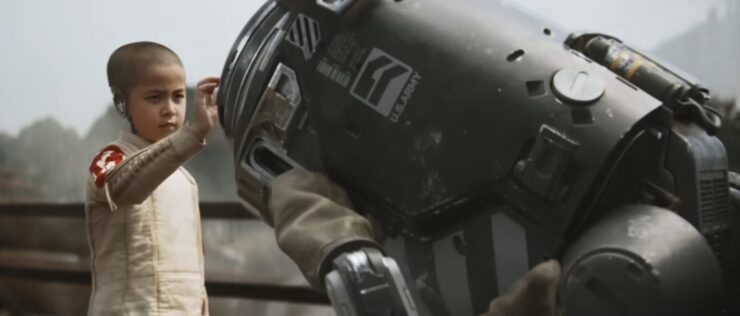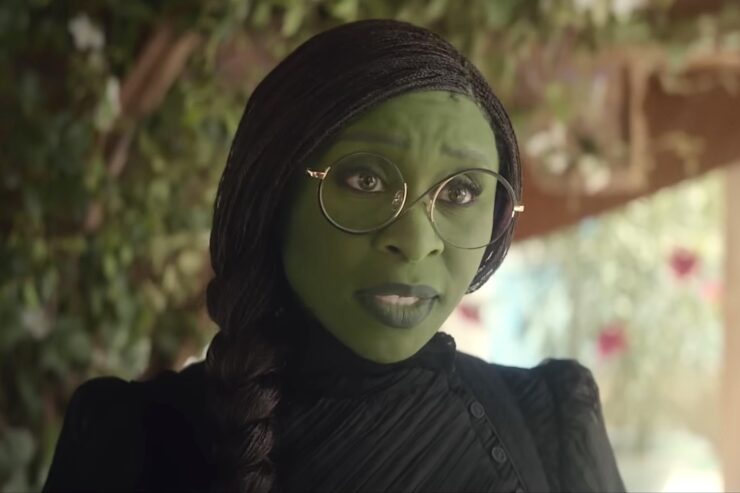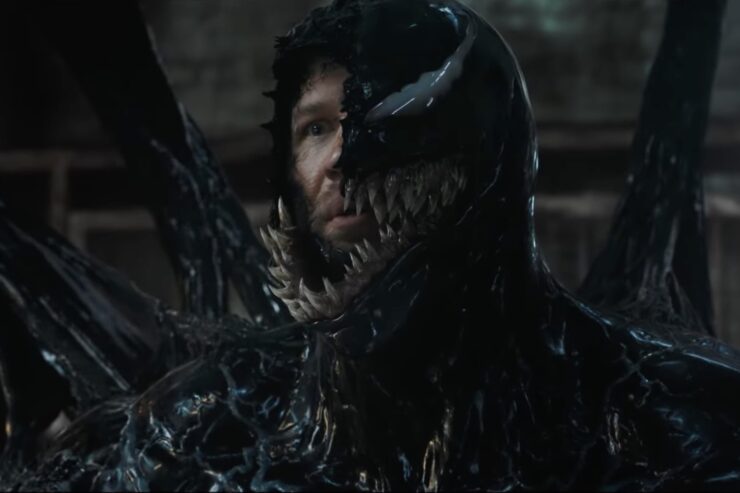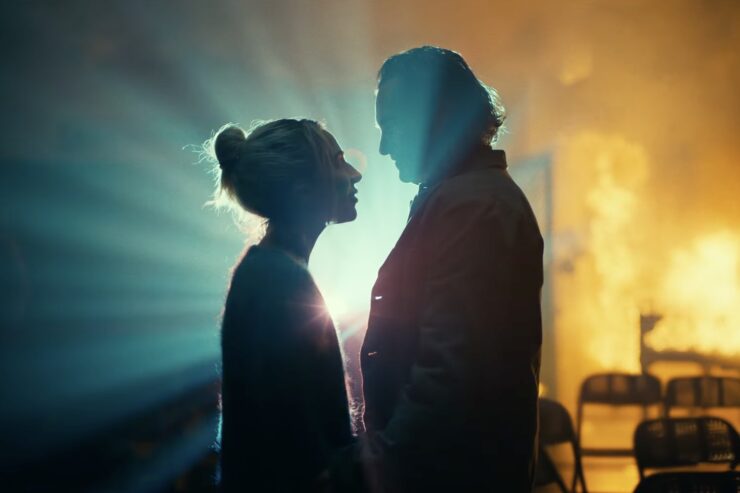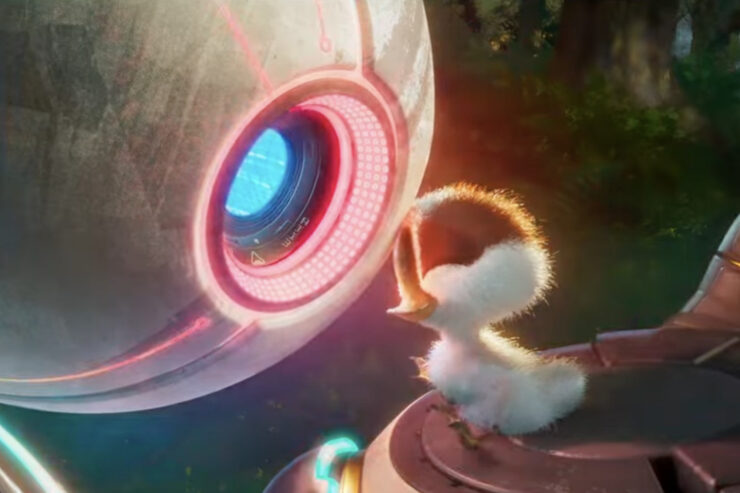Hollywood could do with fewer franchises. Even diehard fans seem to agree, judging by the box office numbers for everything from Fast X to the collecting post-Endgame MCU. And more is on the way—between a slew of Star Wars stories, prequels for The Hunger Games and Willy Wonka, and endless Avatar sequels, it’s hard to escape the feeling that we’ll never get off this ride.
The Creator likely hoped to build its audience on our collective fatigue. The visuals in the trailers promised something brand new and streamlined, and gloriously unburdened by the weight of sprawling multiverses or decades-long continuity issues. So how did it fare in its attempt to free us from the franchise rigamarole?
[Spoilers for The Creator below]
The Creator comes from Rogue One director Gareth Edwards, who was endlessly praised for creating a Star Wars film with heft, excellent visuals, and war-story pathos. While I found myself underwhelmed by the offering, it occurred to me that perhaps what Edwards needed was the chance to tell his own story. A screenplay jointly penned by the director and Chris Weitz (a somewhat baffling choice of collaborator, known best as the co-writer of American Pie and About a Boy) might be precisely what the filmmaker required to do something unique and more impressive.
The Creator begins in a not-too-distant future where “the West” has declared war against all forms of AI (artificial intelligence) following a nuclear attack on Los Angeles. At the same time, New Asia, a seemingly brand new republic of various southeast Asian peoples, continues to embrace AI and foster it in their area of the world. The West fears that further use of AI will result in human extinction, leading to the construction of NOMAD, an orbital platform used to seek, target, and destroy AI from space. Joshua Taylor (John David Washington) is a US undercover operative sent to find “Nirmata,” the so-called creator of AI, and gets close enough to find Nirmata’s daughter, Maya (Gemma Chan), who he marries as part of his cover.
The opening of the story sees Maya pregnant with their child and the couple discussing their future, when a premature op results in Taylor losing both wife and child. Five years later, he’s home in the US and called in for another mission: to find a weapon that Nirmata created to destroy humanity. Taylor isn’t interested until he learns that Maya might be alive and involved in all of this, and the “weapon” turns out to be an AI child (Madeleine Yuna Voyles) with the ability to shut down most technologies using her mind… sort of. Desperate to see Maya again, Taylor winds up grabbing the kid—who he later nicknames Alphie—and rushing around New Asia in ever-more desperate attempts to find his hopefully not dead wife.
Let’s start with the first problem we brush up against: The script wallows in Avatar-style obviousness every step of the way. There is no twist that isn’t telegraphed at the outset, no subtlety that isn’t spoken (awkwardly) out loud to make sure the audience is getting it, and no space for any manner of complexity. When Maya learns that her husband is still working with the US military at the start of the movie and bemoans his choice, he immediately counters that AI isn’t “real” and that they and their child are—setting up an obvious change of heart at the hands of Alphie. It’s all-too-clear that Maya is more than what she seems, and this is only made more irritating when a worker guarding Alphie tells her to escape and find Nirmata… which, spoken by this actor, winds up sounding an awful lot like “your mother.”
Gee, y’all. Wonder who Nirmata might really be.
The Creator is taking the tried and true movie-making route of not explaining everything in its worldbuilding exercise. But an under-explained world still has to make sense at the tertiary level, and this one does not. For example, it’s clear that “the West” means to destroy AI, but the parameters of this war are never explained outright: If there was a war going on between the major powers that be, nuclear annihilation would be the likely result, but instead western powers are bullying eastern ones with their orbital space platform. So New Asia doesn’t protect their own citizens from foreign space attack? Why wouldn’t they? Is the point that they can’t, and if so, how are they in a position to disagree with western demands about AI in any capacity?
Are the actions of the US military and the NOMAD platform meant to be a commentary on western might and the horrors of imperialism? Obviously. But that doesn’t change the fact that a conflict of this nature wouldn’t play out like this because “the West” is not the only global player at present with “big sticks” to use against their enemies. If you break recognizable international politics to this degree, you need an entirely new system to take its place, but Edwards and Weitz clearly weren’t interested in creating that much of the future. It exists as a moodboard backdrop and nothing more. There’s a suggestion (finally) toward the end of the film that people around the world are protesting the use of NOMAD, but we never see them anywhere, or find out how this conflict plays to populations around the world. The whole conceit is simply “the West v New Asia”—Africa and South America might as well not exist for all that The Creator thinks of them. And this is only the tiniest tip of a shattery iceberg; the whole film is riddled with worldbuilding errors like this, full up on rules that don’t make sense no matter how hard you twist your head sideways to view them from a different vantage point.
Moreover, the ways in which this future doesn’t make sense come off incredibly racist in their construction. The idea that a significant swath of Southeast Asia would easily and jovially meld itself together into one uber-country is not only ignorant, but smacks of the true purpose behind constructing a near-future this way: using Asian cultures for aesthetic purposes without ever having to do the work of knowing or differentiating them. The Creator uses all of the western cinematic favorites in its New Roast Blend of Asian cultures—Vietnam War visuals; Tibetan temples and wise be-robed monks; Ken Watanabe as a samurai-coded robot; quaint fishing villages and overcrowded cities.
It’s never wrong to make our fiction more reflective of the diverse world we live in. It is always wrong to use entire cultures to give a story “flavor,” and while The Creator doesn’t dehumanize its Asian characters, it definitely cannot tell you where any of them come from. It’s pointed that Gemma Chan’s character is called Maya Fey, a European surname with a first name that places its Asian origins in India. It’s pointed, too, that the writers probably chose the name for its Greek meaning (Maia translates to “mother”), and that the name Nirmata (meaning “creator”) is Nepalese… and was likely chosen for how it sounded to an English-speaking ear.
Even setting these worldbulding blunders aside, there’s still the messages around AI to consider in this film. Science fiction has a long history of using robots and their relatives as allegorical stand-ins for anything humanity has prejudices around. From Data in Star Trek to replicants in Blade Runner to Bubs in Space Sweepers, we’ve seen artificial life used to counteract narratives dealing in racism, gender identity, neurodivergence, and on and on. It’s such a common device that there’s been a pushback in recent years, fearing that the (over)use of allegory has allowed audiences to avoid difficult subjects by gilding the lily, so-to-speak. And The Creator is absolutely using AI as a stand-in for human prejudices; the sheer volume of shots where we see children crying in the arms of one of the “simulants,” or their less advanced cousins (or, frequently, crying over their dead bodies), makes that glaringly apparent.
The trouble is that reality has caught up to us. And these conversations aren’t allegorical or even theoretical any longer. AI (though what we’re currently calling artificial intelligence is, annoyingly, not proper AI in any sense) is fast-developing and the very studios making these films want to take creative work from people in favor of using these technologies. Does the film have an opinion on that? Well, no. In fact, it thought to make use of those very technologies and call itself clever; Gareth Edwards recently gave an interview where he admitted that he worked with a company that makes AI-generated music in order to create a Hans-Zimmer-like soundtrack for the film… but wound up opting for the real thing instead because the AI version was a “7 out of 10 […] but in the back of my head, I was like, ‘But the reason you go to Hans Zimmer is for 10 out of 10.”
Just. Just no sense of the extreme and flagrant irony here, huh.
So no, the film doesn’t make any true or meaningful attempts to consider the ways in which technology might completely alter the shape of our lives. It spends all of its time opting to show the ways in which humans and AI are exactly the same, in increasingly eyeroll-inducing fashion. To start, Taylor has two prosthetics limbs—so how much of him has to be artificial before he’s basically a simulant too, right? Taylor later learns that one of his old undercover buddies has fallen in love with a simulant… who gets murdered, and he mourns her the same way he’d mourn a human, so we’re the same, see? This AI is walking a child down the road and stumbling like a tottering grandparent, and if this innocent child thinks that the AI is a person it definitely is a person, do you get it??
The film’s obsession over who gets to be a person can’t be meaningful because it isn’t asking any profound questions about the nature of existing. Instead, it spends its time having Taylor induct little Alphie into the concept of “heaven”—which she worries they won’t get into, because Taylor claims he’s bad, and she’s not a person. But it’s okay because Taylor assures her that she is one by the end, and that he will definitely get into heaven because she saved him. (Don’t even get me started on the weird conflation this film seems to be making between generic Chosen Ones, Jesus, and the Dalai Lama…) Do we ever deal with the fact that The Creator seems to state in no uncertain terms that Western militarism and imperialism is bad, but Christianity is unequivocally good by these measures? Does the film really think that those subjects can be untangled so easily? It’s absolutely wild to watch it try, in any case.
Even taking the really big thoughts and shoddy construction issues off the board, this film is tonally all over the place. There are multiple points where the action takes a lighthearted tack in places where it should not consider any form of lightheartedness. The number of times that children are fired on (even if they’re sci-fi energy style weapons) is staggering—in fact, there’s a point in the film when Taylor endangers the lives of a family with five small kids in order to avoid detection, and the action sequences that follows is largely played for laughs.
It feels important to note that the actors are largely excellent throughout and cannot be blamed for the mess this film creates. Washington does his best to embody western-arrogance-having-a-change-of-heart, though the fact that the film thinks he should be the vehicle for that journey without ever once noting or considering how western imperialism and colonialism has effected Black Americans sure is a choice for the movie to make. Chan has better chemistry with Washington than she had with Richard Madden in The Eternals, at least—though this does wind up reading like a film-length fridging exercise by the end, because there are even more areas where the story falls down and never gets back up. Voyles’ turn as Alphie is stunning, for sure, and I hope to see her in anything at all going forward.
But when all is said and done, The Creator is not the answer to our over-franchised future than some might have hoped. Looks like we’ll have to satisfy ourselves with another Marvel or a Dune while we wait.
Emmet Asher-Perrin really only hit on a fraction of the things bothering them in this film, if you can believe it. You can bug them on Twitter and Bluesky, and read more of their work here and elsewhere.










